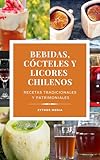
Since 2009, and every April 15th in our country, Chile celebrates Chilean Cuisine Day, a special day that seeks to recognize the rich geographic diversity of a diverse and vibrant gastronomy, which not only acknowledges the importance of local food traditions but also promotes awareness of nutrition and the consumption of local products.
Chilean Food Day was officially established through Decree 23 of the Ministry of Agriculture, under the mandate of President Michelle Bachelet, which states:
Each year, the Ministry of Agriculture will organize, together with trade and gastronomic associations, restaurants, chefs, ethnic groups, animal breeders, farmers, fishermen, sponsoring companies, and other interested parties, a tasting of Chilean Cuisine Food.
The idea emerged as an initiative to promote the recognition and appreciation of traditional Chilean recipes, as well as to boost the local gastronomic industry. The proposal was consolidated with the support of chefs, restaurateurs, gastronomic critics, and the general public, who saw the need to dedicate a day to celebrate the culinary richness of the country.
What is Chilean cuisine?
Historiographical studies on Chilean gastronomy highlight that its development is the result of the interaction between three distinct culinary currents. Initially, the indigenous substrate (north, center, and south) provided fundamental ingredients such as corn, potatoes, beans, squash, and chili peppers, which continue to be pillars of current Creole cuisine.
In turn, Spanish influence introduced a variety of products, techniques, and culinary practices such as wheat, stew, or empanadas, which mixed with indigenous ingredients, originated a mestizo cuisine that was consolidated during the Colonial period.
Later, towards the end of the 19th century, the influence of French culture on local elites brought with it the adoption of recipes from European gastronomy, further enriching and defining the country’s culinary repertoire.
Events and activities
The institutionalization of Chilean Food Day has had a significant impact on the appreciation of national gastronomy. This celebration helps strengthen cultural identity, promotes the conservation of ancestral recipes, and encourages responsible and conscious consumption practices.
Additionally, it has served as a platform to educate new generations about the rich culinary tradition of the country and the importance of healthy eating.
In various cities across the country, restaurants and cafes offer special menus highlighting typical dishes such as corn pie, stews, empanadas, mashed beans, crab stew, curanto, conger chowder, among others.
Furthermore, food fairs are organized where local producers can exhibit and sell their products, thus promoting the local and sustainable economy.







